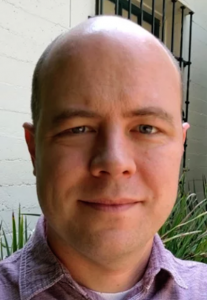Striving to avoid congregational conflict can backfire in churches where members feel unable to live and worship authentically within their own fellowships, according to the author of a new book on addressing divisions within Baptist churches.
“What happens in many instances is that people do not feel free in our churches to speak their stories and name their truths,” said Christopher Schelin, author of The Contestable Church: Dissent, Democracy, and Baptist Ecclesiology.

Christopher Schelin
“An example in moderate Baptist spaces has been the shying away from hard conversation about the presence of LGBTQ persons in the church and what collective stances may be made about affirmation and inclusion,” said Schelin, an American Baptist minister who serves as dean of students and assistant professor of practical and political theologies at Starr King School of Ministry, a Unitarian Universalist seminary in Oakland, Calif.
Schelin said he has been in churches where the presence of gay members was an open secret considered too scandalous to talk about.
In those cases, everyone loses out on opportunities to forge deeper relationships rooted in truth and love, he says. “A stepping away from the hard conversation means that people have to hide these truths about themselves. And if church is going to be anything, it should be a place where we can be fully present with one another.”
But The Contestable Church also examines the other end of the spectrum of church conflict as inevitable and potentially constructive in grasping the mind of Christ, he said.
Schelin proposes faith groups apply the principles of radical democratic political theory based on the work of political scientist Romand Coles. The process encourages robust and often messy discourse as a means of achieving political consensus. “Applied to the church, it seeks the tension of conflict so that through a respectful, conflictual encounter we can discover new ways of being the church.”
And who better to experiment with the approach than Baptists, whose lack of centralized authority and emphasis on individual conscience have engendered historic infighting and fractured communities, Schelin notes in his book.
“The very first Baptist church became the very first Baptist church split.”
“The very first Baptist church became the very first Baptist church split as Thomas Helwys led 10 members of John Smyth’s community in Amsterdam to withdraw in protest over Smyth’s overtures to the local Mennonites. Early English and American Baptists coalesced into separate denominations that disagreed over the scope of Christ’s redemption or the proper day for worship.”
The tradition of dispute-and-divide continued in the U.S. when fundamentalists, offended by perceived liberalism in some churches, departed the Northern Baptist Convention during the 1920s and 1940s, and again when conservative control of the Southern Baptist Convention led non-conservatives to form groups such as the Alliance of Baptists in 1987 and the Cooperative Baptist Fellowship in 1991.
“This large-scale survey of denominational conflict necessarily elides the innumerable, and largely undocumented, controversies that have affected individual congregations over four centuries of the Baptist tradition,” Schelin writes. “Their participatory polity not only invites members to form habits of responsibility, attentiveness, creativity and humility but also fosters vices of manipulation, bickering, partisanship and abuse of power.”
To prevent these tendencies from creating further paralysis and division, Baptists must reconceive their ecclesiology in a way that predicts and harnesses recurring conflict, he advises, saying radical democracy offers a way through congregational friction by viewing conflict as essential and necessary and by providing spaces where the expression of opposing viewpoints is encouraged and nurtured.
“Baptists who accept this affirmation of constructive conflict may justly, but only analogously, consider their ecclesiology to be radically democratic in character,” he says. “This way of being the people of God in and through disagreement, with the aim of growing in faithfulness, I call the contestable church.”
“This way of being the people of God in and through disagreement, with the aim of growing in faithfulness, I call the contestable church.”
Schelin said his book also shows how Baptists have worked through conflicts in healthy ways: “Time and again in the church, we found ourselves having to discern new ways to discern what it means to be faithful. Had we stuck with old or prevailing assumptions, we would not have made progress toward more fully living out the gospel on issues like racism and the dignity and role of women in the church.”
The key is to go through — not around or away from — disagreements over deeply held, sincerely considered views on what it means to be followers of Christ. Baptists also should strive to reimagine doctrines such as the priesthood of believers, soul competency and pastoral authority to steer clear of conformist authoritarianism and extreme individualism, Schelin said.
 “We must engage in conflictual conversation in the hope that by deeply listening to one another the Holy Spirit may guide us forward to new understanding. Radical democracy invites a humble patience in those conversations to pause and consider, ‘How do I look at things differently by my encounter with the other?’”
“We must engage in conflictual conversation in the hope that by deeply listening to one another the Holy Spirit may guide us forward to new understanding. Radical democracy invites a humble patience in those conversations to pause and consider, ‘How do I look at things differently by my encounter with the other?’”
Congregations interested radical democracy may consider ways to promote the corporate dimensions of religious community, he said. “One way to begin is to get back to the shared reading of Scripture. We have often reduced Bible study to individual spirituality, or we have routinized it by following curricula and lesson plans that publishers produce for us.”
Schelin said he once led a Sunday school class that read one Lectionary passage twice, then discussed what it meant to the students. “There was no agenda, no goal. I was not directing the class to any conclusion. I just let people speak about what they noticed. It was very powerful and sometimes it was very surprising to see what emerged for people in that process.”
Moving to a consensus decision-making process also fosters radical democracy by requiring more time considering differing viewpoints than discussions governed by Roberts Rules of Order, he said. “It is more nuanced and deliberately avoids that zero-sum approach to conflict by taking more time and work through disagreements.”
The Contestable Church is part of the Perspectives on Baptist Identities Series by Mercer University Press, which also features Crawford Howell Toy, by Mikeal C. Parsons, Inhabiting the World, by Ryan Andrew Newson, Sources of Light, edited by Amy L. Chilton and Steven R. Harmon, and The Global Mission of the Jim Crow South, by Joao B. Chavez.


